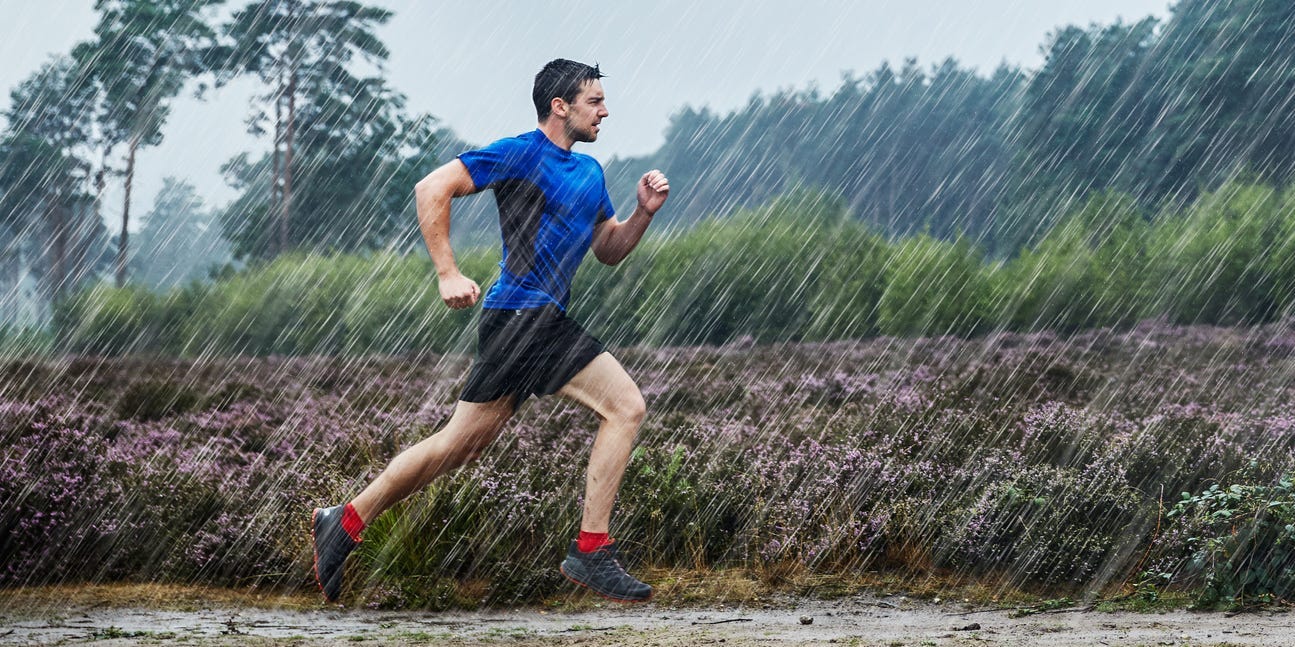
Tim Robberts/Getty Images
- It is safe to run in the rain as long as it is not thundering, lightning, or you can't see.
- To run in the rain, wear proper clothing, shoes with good traction, and reflective gear.
- Running in the rain can be beneficial in preparing you for tough race day conditions.
- Visit Insider's Health Reference library for more advice.
Most runners know the feeling: You've just finished lacing up your shoes and are ready to hit the pavement when you notice the first few tell-tale plops of raindrops plummeting from the sky.
While you may think it's time to call it quits or begrudgingly hop on the treadmill, there are some precautions you can take to ensure a safe and comfortable run in the rain.
Is it safe to run in the rain?
Yes, it is generally safe to run in the rain with the exception of lightning, storming, or downpouring, says Audrey Springer, a certified running coach with Relentless Runners.
Runners should always check the weather forecast the night before their runs, says Ryan Miller, a head running coach for the Maverick Running Community. This will help you determine when to schedule your run to avoid dangerous conditions.
Although it's generally safe to run in the rain, your performance may take a hit.
"Performance in the rain depends on the conditions you're running in," says Springer. "The heavier the rain, the more likely your performance will suffer. She suggests going into your run with the expectation that you might not perform as well as usual.
"Your body will still reap the benefits of the run even in the tougher than normal conditions," he says.
How to run in the rain for optimal performance
If you want to run in the rain, there are a few important safety measures you should take.
1. Wear the proper clothing
Wearing the right clothes can help improve your running performance during a drizzle.
Keep in mind that everything you wear during a rainy run will absorb water, adding extra weight, says Miller.
One way to alleviate this is by wearing moisture-wicking fabrics, says Springer. These fabrics work by pulling moisture away from your body and repelling water.
Miller suggests wearing a waterproof windbreaker and a snug-fitting wicker-cap to keep the rain out of your eyes
2. Wear running shoes with solid traction
It's important to wear shoes with good traction in order to better grip the ground.
"The surface you are running on will be slicker during the rain and could even border on dangerous if the outsole on your shoes are worn down," says Miller.
You can tell if your running shoes have lost proper traction by looking at the soles. If they are worn down or torn up, that means it's time to replace them.
3. Increase your visibility
If you are running on the road during heavy rain, it's important to make yourself visible to drivers to prevent accidents "I take into account that if I'm running on the road and it's raining so hard that I can barely see, it's likely a driver can't see me," says Springer.
To make yourself more visible wear reflective clothing or a headlamp during your runs.
Benefits of running in the rain
In general, rain tends to make for slower runs, except light rains that cause a temperature drop.
"Rain can bring the temperature down quickly and significantly, which can make running in hot summer temperatures less strenuous and increase performance," says Miller.
If you are a competitive runner, running in the rain can also help prepare you for race day. "It's inevitable that you'll encounter a race day in the rain so training in all conditions can be beneficial," says Springer.
Insider's takeaway
It's generally safe to run in the rain as long as you avoid running during lightning, thunderstorms, or extremely heavy rain.
You can make rainy weather runs more comfortable and safe by wearing moisture-wicking clothing, reflective gear, and ensuring your running shoes have plenty of traction.
Springer says one phrase she reminds herself of when running in the rain is, "there is no such thing as bad weather, just bad gear."